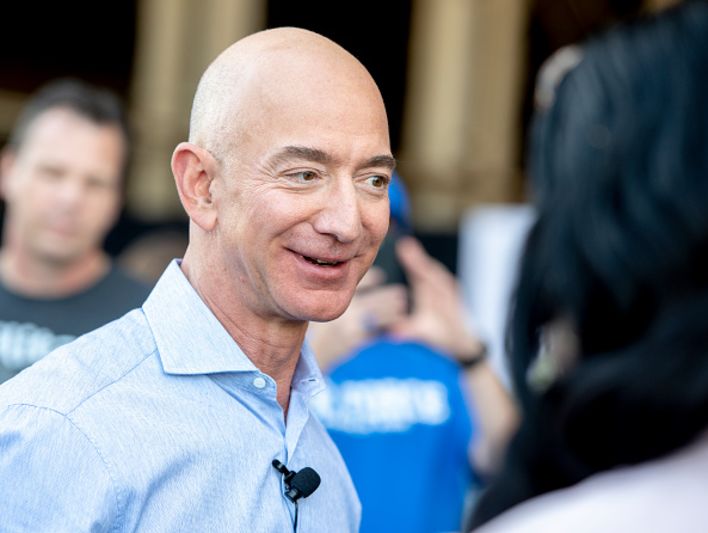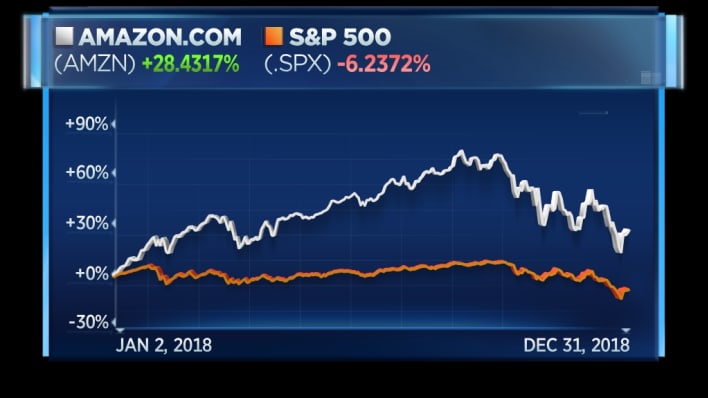
Amazon lost its status as a stock market darling in the fourth quarter, when the company’s shares plunged 25 percent, their steepest quarterly drop since 2008.
While a large part of the drop was due to the broader market sell-off, investors were also spooked by Amazon’s disappointing quarterly results that showed slowing revenue growth across the board.
Still, Wall Street analysts remain as optimistic as ever and are predicting a bounce back in 2019. According to FactSet, 41 of the 42 analysts with ratings on the stock recommend buying it, with KeyBanc’s Edward Yruma as the only analyst with a “hold” rating. There weren’t any downgrades in the fourth quarter.
“I’m very bullish on Amazon right now,” Loop Capital’s Anthony Chukumba, who has a “buy” rating and $2,200 price target, told CNBC. “I feel very strong about its fundamentals.”
Amazon’s market capitalization briefly topped $1 trillion in September, but is now worth roughly $733 billion, trading at around $1,575.39 per share at Friday’s close.
Chukumba said investor concerns of a slowdown are overblown, because the company has been more focused at growing its profitability than revenue in recent years. Almost all of Amazon’s high-growth businesses, such as cloud and advertising, have bigger profit margins than its traditional retail segment, although their revenue size is much smaller.

Even within its retail business, Amazon is seeing a shift towards a more profitable model as more products are now sold through its third-party merchants. When Amazon sells a $100 product directly from its own inventory, it books the whole $100 as revenue. When the same product is sold through a third-party merchant, Amazon records a portion of the $100 as revenue, because it only accounts for commission and certain fees. But the margin is higher.
This move from being a seller of products to a collector of fees is causing an “investor transition” period for Amazon, said Simeon Siegel, an analyst at Nomura Instinet. It takes time for investors to get comfortable with slowing sales but higher profits, as it normally signals a maturing company, he said. However, in Amazon’s case, it’s a proactive shift that doesn’t reflect weakening fundamentals.
“We expect Amazon shares to rise over the year as investors gain comfort in rising profits from healthier revenue flow,” Siegel said.Bargain price
Amazon’s fourth-quarter slump was part of a market route that reflected concerns of rising interest rates, a slowing economy and political uncertainty. The S&P 500 had its worst year since the 2008 recession.
In a note published this week, Evercore’s Anthony DiClemente dropped Amazon’s target price to $1,800 — one of the lowest among all analysts — citing broader market volatility and the “current market compression.”
DiClemente wrote that the current price represents a “bargain” for investors, as the company’s leading position in online retail and cloud computing puts it in a good position to deliver strong results.
“Anywhere in the $1,500 range provides investors with a rare opportunity to own the clear leader in cloud and e-commerce,” DiClemente wrote.
Although AWS revenue fell slightly below estimates in its latest quarter, the cloud unit still generated a record $6.68 billion in revenue, accounting for the bulk of Amazon’s operating profits.
Brent Thill from Jefferies said AWS’ massive recurring revenue stream and profitability enable Amazon to invest more aggressively in its core retail business, while expanding profit margins.
“It’s one of the biggest competitive moats in technology,” said Thill, who has a “buy” rating and $2,300 price target.Less company-specific issues
Amazon has had some controversies of late, whether it’s criticism from President Trump related to taxes and Jeff Bezos’ ownership of the Washington Post, or the way the company handled its search for a second headquarters.
But none of that should be a drag on the stock, making Amazon more appealing than some of its peers like Apple and Facebook, said Loop Capital’s Chukumba. Apple, for example, saw its stock sink this week after cutting its revenue forecast because of slow iPhone sales in China. Almost half Facebook’s value was wiped out last year over privacy scandals, and Google has faced plenty of criticism for data privacy issues.
“Amazon does not have the company-specific issues that many of the rest of the companies have,” Chukumba said.
Tom Forte of D.A. Davidson, the most bullish Amazon analyst with a price target of $2,450, said while the trade conflict between the U.S. and China remains a big unknown, it has potential to work in favor of Amazon. The Chinese government could end up making concessions that allow Amazon and other U.S. companies to play on a more level playing field against local competitors.
“Any concessions made by China should be favorable to Amazon, as it has been for the most part shut out of China,” Forte said.





























